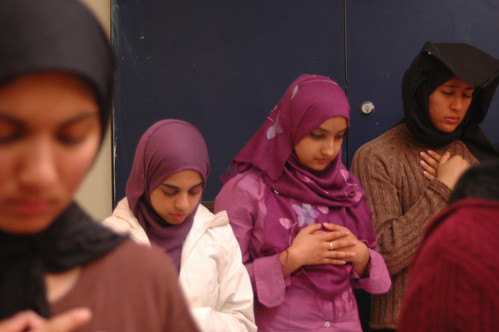Members of Temple’s Islamic community have been spending approximately 14 hours of each day since Sept. 1 without food, drink or sexual relations.

Ramadan, the Muslim holy month, began this year with a full moon, according to the lunar calendar. The month will end approximately 28 to 30 days later upon physical sight of the next full moon with the Islamic three-day holiday, Eid al-Fitr.
“We do it for the hungry and the poor so we can know how they feel,” said Mohamed Salah, sophomore biology major and vice president of Temple’s Muslim Student Association. “It’s not easy and it’s not supposed to be, but as the month goes on it does get more tolerable. If you’re doing it for the sake of God, you’ll end up enjoying it.”
Ramadan is an Islamic obligatory ritual and the third of five pillars of the faith. According to the Quran, fasting during Ramadan is to give oneself a sense of God consciousness.
MSA held an event on Sunday, Sept. 21 in which they invited non-Muslims of the Temple community to fast with them. Each of the approximately 80 non-Muslim participants in the Fastothon was sponsored by a business. The event raised close to $1,000, which was then donated to Philabundence, a local hunger relief organization.
“I think it’s a terrific gesture because it allows them to see what Muslims are actually feeling,” said Temple assistant professor of religion Zain Abdullah. “The only way to really be empathetic is to walk in someone’s shoes. You feel the spirituality and compassion for humanity that is instilled in this whole practice. Empathy is what we need. Ramadan is very important for Muslims as well as non-Muslims.”
MSA also maintained a tradition throughout the month in which they broke fast together at sunset on Tuesdays and Thursdays in the Student Center. Members opened with a traditional eating of dates and then held evening prayers and ate dinner together.
Temple Islamic students attempt to maintain a balance between their faith-driven fasting and first month of school work.
“Religion comes before everything else,” Salah said. “It’s only the beginning of the semester so it doesn’t really hurt us.”
The final 10 days of Ramadan are the most important to Muslims because it is the period in which they pray intensely and seek forgiveness for their sins of the past year. At the start of Eid al-Fitr, Muslims will make special prayers and hold a huge feast in celebration.
“It’s nice that we have a big Muslim community on campus because we get support,” said Shaista Ahmad, senior information science and technology major and board member of MSA. “It’s fun when there are a lot of people fasting together. It helps you remember the less fortunate who can’t choose when to eat and when not to eat, and it makes you feel stronger because you’re able to eat but choose to give it up.”
Muslims typically begin fasting during Ramadan when they reach puberty and are considered adults within their religion.
“Islam comes from the word ‘salam’ which means peace,” Abdullah said. “Fasting is about embodying the meaning of Islam, which means embodying peace.”
Abdullah also said that the real achievement during Ramadan is to fast within a state of peace. The Quran states that fasting is the only ritual which God will reward directly.
“You can’t observe someone fasting,” Abdullah said. “It’s very personal because it really brings one into direct communication with God.”
Fasting gives one a sense of reliance on God because food is a necessity but one is forced to rely on God to stay alive rather than food, Abdullah said.
“God will keep you going,” Abdullah said. “It catches you at a very existential reality. God is your sustainer.”
Kathryn A. López can be reached at kathryn.lopez@temple.edu.



hello there,
Nice, post here may come back soon